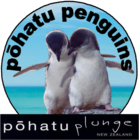What we do
Trapping
Introduced predators a threat to their very existence.
The main predators which have the biggest impact in the Pōhatu colony are: rats, hedgehogs, weasels, stoats, ferrets, possums and feral cats.
Penguins never had to deal with any land mammal predators before. They did not have time to adapt to this new situation. Without controlling the number of predators we would have no penguins!We have different trapping methods but the main one is instant kill traps. DoC 150 and DoC 200 are A-class humane traps. We also use Timm’s traps for feral cats and possums and Good Nature traps for rats and stoats.
All traps are baited with a lure. Over the years we have experienced different types of lure: we can use mouse pee spray, goose meat, rabbit meat, stoat pheromones, blood, cat food, rabbit poop. The most efficient lures so far are: fresh meat, mouse pee and rubbing a dead stoat - reasonably fresh - through the traps so the smell rubs off. This seems to attract other stoats but you may not be able to catch rats in the trap for a while after that.
Trapping is done by the Pōhatu Penguins team and when guides aren’t running tours, they are actively involved in the conservation work.
Traps are set around the property and the penguin colony in areas where predators may be present. Getting to our traps involves a lot of hiking. There are various trap lines with over 200 traps set around 315 ha of habitat checked weekly.
At certain times of the year, we often find wild kittens around so we use live catch traps, which doesn’t hurt the animal just catches them in a cage. Cats can have a huge impact on native forest birds and marine birds, including penguins and even adult albatrosses in some areas of New Zealand.
If we find young kittens, we do believe they can become lovely pets. We bring them to SPCA or we may manage to find a family to take them in in the township where wildlife is less abundant. Cats can be deadly predators but some actions can easily be taken to reduce and eliminate their impact.
Here are some important rules to become a responsible cat owner:
- One way to stop your pet cat from killing birds is a cat bib: www.catbib.com.au
- Neuter your cat to avoid cat population to increase, there are already enough cats to be adopted.
- Keep your cat(s) inside as much as possible. Cats can kill as many birds at night as during the day but keeping them inside at night not only keeps them from killing wildlife 50% of the time but also keeps them healthy: www.pethealthnetwork.com
 |
 |
 |
|
An introductory video about the importance that marine birds play in our marine environment, and the importance of research allowing us to understand their behaviours and marine habitat use to better protect them.
|
To celebrate the 10th anniversary of the Akaroa Marine Reserve and the 25th anniversary of the Pōhatu Marine Reserve, key stakeholders gathered on the 10th of March during Sea-week 2024 to commemorate these achievements for New Zealand marine wildlife. |
Hear from Dr Rachel Hickcox about the importance of monitoring a penguin colony. |
|
Discover the ins and outs of our Adopt a penguin program
|

